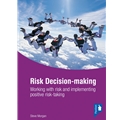Risk Definitions
 Thursday, November 11, 2010 at 4:32PM
Thursday, November 11, 2010 at 4:32PM Risk:
is the likelihood of an event happening with potentially harmful or beneficial outcomes for self and others. (Possible behaviours include suicide, self-harm, neglect, aggression and violence; with an additional range of other positive or negative service user experiences).
Risk Assessment:
is the gathering of information through processes of communication, investigation, observation and persistence; and analysis of the potential outcomes of identified behaviours. Identifying specific risk factors of relevance to an individual, and the circumstances in which they may occur. This process requires linking the context of historical information to current circumstances, to anticipate possible future change.
Risk Management:
is the statement of plans and the allocation of responsibilities for translating collective decisions into real actions. It is the activity of exercising a duty of care where risks (positive and negative) are identified. It entails a broad range of responses linked closely to the wider process of care planning. The activities may involve preventative, responsive and supportive measures to diminish the potential negative consequences of risk and to promote potential benefits of taking appropriate risks. These will occasionally involve more restrictive measures and crisis responses where the identified risks have an increased potential for harmful outcomes. It should also clearly identify the dates for reviewing the assessment and the management plans.
Positive Risk-Taking:
[From: Morgan, 2004]: is weighing up the potential benefits and harms of exercising one choice of action over another. Identifying the potential risks involved, and developing plans and actions that reflect the positive potentials and stated priorities of the service user. It involves using available resources and support to achieve the desired outcomes, and to minimise the potential harmful outcomes. It requires an agreement of the goals to be achieved, or a clear explanation of any differences of opinion regarding the goals or courses of action.
Morgan, S. (2004) Positive risk-taking: an idea whose time has come. Health Care Risk Report 10 (10) 18-19.
Morgan, S. (2007) Working with Risk Practitioner’s Manual. Brighton: Pavilion Publishing.







Reader Comments